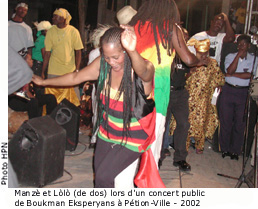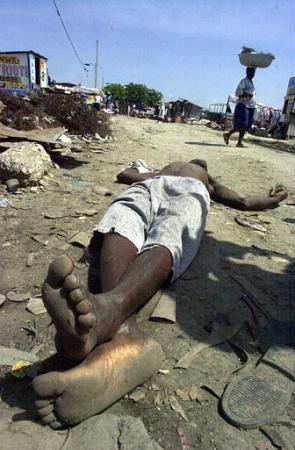 |
 |
| Want to send this page or a link to a friend? Click on mail at the top of this window. |
| Posted September 24, 2002 |
| For Democracy to Prosper, Haiti |
| Aristide Must be Dealt With |
| ________________ |
| By Christopher G. Fauntroy |
Barely two weeks after Haiti's elections in May 2000, Leon Manus, the constitutional chairman of Haiti's electoral college, was summoned to that country's White House. The message given to him by the Presidents Rene Preval and Jean-Bertrand Aristide: "you published our results in favor of our party or you are a dead man". The embassies in Port-au-Prince acted on these credible death threats against Manus by sending a helicopter to take him into exile.
Manus, a respected 84 year old lawyer, thus landed in the United States with one bag, leaving behind his life earnings. Haiti's ruling Fami Lavalas party would later send thugs to destroy his business. By September 2002, two years in exile in the U.S., Manus' political asylum request has yet to be approved, as well as social security provided; his current status does not allow him to work.
| In the photo (L) Boukman Eksperyans, a popular Haitian musical group, highly critical of tyrant Aristide's gross incompetence, rampant corruption and narco-trafficking, banned by the brutal dictator, on Sept. 18th, 2002. In the photo (R) the body of a man killed by ferocious Aristide's thugs in the Port-au-Prince's slum of Cité Soleil, on Sept. 18th, 2002. |
|
|
Today, diplomats from a multilateral organization based in Washington are ignoring the continuing cycle of violence such as in the Manus' case, and are supporting elections in Haiti without addressing the issues of political violence and security. Haitians who want to participate in the political and electoral process have not forgotten the symbolic significance of the Manus case and those of the many other Haitian democratic and human rights activists. Scores of journalists, members of the private sector, religious leaders, representatives of political parties, have also been killed or forced into the harsh reality of exile for standing up for their democratic rights. Unfortunately, the very same international community which encouraged them to be involve in the beginning of the electoral process of 2000, now seems to have let them down. Should this trend continue, any electoral process in Haiti will not be viable.
A positive sign is that the Organization of American States (OAS) passed resolutions 806 and 822 in September 2002 to pressure the Haitian government to stop its egregious practice of mass violation of human rights. The OAS also released a Report of Inquiry of the events of December 17, 2001, during which supporters of Lavalas torched political party headquarters, and the homes of Haiti's democratic political leaders and journalists. The Report clearly identified the individuals responsible as associates of Aristide and the Lavalas and offered recommendations for the government to change its behavior. However, the Haitian government has not implemented a single recommendation, nor has it arrested any of the individuals in question.
More importantly, the Haitian government has not implemented neither resolutions 806 nor 822. Instead, similarly to the situation in Iraq, the Aristide government continues to act in defiance of all the international community resolutions since May 21, 2002, and the promises it had made to Presidents Bush and Clinton. Like Saddam Hussein, Aristide has created a political culture where thugs rule with impunity, where drug trafficking is flourishing, and corruption is the order of the day.
While defying the international community for the last 26 months, the Haitian government is at the same time making erroneous statements through well-funded lobby firms and lawyers in the United States that it is complying. Some of the firms that pedal these untruths include former congressman Ron Delumn, Ira Kurzban among others.
Indeed, the extent of the lobbying efforts is such that Aristide has organized one of the best-funded lobbies in Washington costing millions of dollars. Part of Aristide's strategy is to accuse the United States of "economic terrorism" toward Haiti. In the spirit and letter of the Democratic Charter, the United States have asked Haiti to address its human rights record, fraudulent election, and corruption * the common denominator of Haiti's governance. However, Aristide's campaign against the Bush administration and Congress has not succeeded. One Congressman who fully apprehends the situation in Haiti had summed the mood in Congress: "Aristide is making speeches in the press for the international community while at the same time he is doing just the opposite inside Haiti."
In the past two weeks, politically motivated violence in Haiti has indeed been on the rise. The same thugs identified by the OAS Report, now strengthened by the Aristide dominated police, continue their violent actions against political and democratic activists. Journalists continue to be persecuted, students routinely beaten, while businessman forced into bribes and racketeering rings. Aristide's government is now using Haiti's department of revenue as a repressive weapon to go after anyone in the media, private sector, or any politically active individual, to prevent any involvement in challenging his authoritarian rule.
Perhaps the best solution to the complex situation in Haiti is for the international community to support general or local, municipal, and legislative elections under its direct supervision as soon as possible. Yet, to be able to organize free and fair elections in Haiti, the security environment must be changed. A key umbrella organization, The Haitian Civil Society Initiative, has put forward a specific proposal to stop the violence and create conditions for credible elections. This proposal calls for deployment international police monitors and human rights observers in the country as well as the technical and logistical component to assist the election organization and governance.
Without this kind of international engagement and assistance, it is almost certain that Haiti's electoral process will be characterized by violence fostered by the regime in power, and anything but free and fair. In addition, the majority of Haitians will not participate in elections left at the mercy of the Aristide autocracy for their lives and the lives of their families will be threatened, their homes and businesses burned, leaving the possibility of exile as an option. Manus is a powerful example of Haiti's saga under Aristide.
Any effort to begin the electoral process without changing the current violent environment as it seems to be the case today is certain to send democracy efforts in Haiti a death knoll. Another $20 million of U.S. taxpayers monies may be wasted under the guise of assisting Haiti's elections. The U.S. Agency for International Development (USAID) thus far had spent more than $200 millions of U.S. taxpayer monies allegedly reforming Haiti's judiciary, police, and electoral process since 1995. Today, there is nothing to show for it, the police is politicized and actively aids drug trafficking and political violence, the judiciary is a repressive tool functioning solely to crush the Aristide governments' opponents, while all elections have been fraudulent and manipulated in favor of the ruling Lavalas party.
In addition, the Haitian government has used violence, threats, and diplomacy to drive out U.S. NGO that promote democracy and the rule of law. It is indicative that the representative of the International Foundation of Electoral System (IFES) has been declared persona non grata for issuing a report for USAID about the government efforts to rig the 2000 elections. Similarly, the International Republican Institute (IRI) has been driven out by threats and violence by members of the Lavalas party, and has been unable to go back and resume its work. Only those NGOs who accommodate to the current state of affairs dictated by the Aristide government are allowed to operate in Haiti.
Although many Caribbean countries often express their solidarity with the people of Haiti, they however have not offered any financial support for Haiti's political development and electoral exercise. Since 1997, Haitians have been denied the right to choose freely their elected leaders, and the opportunity to stop the imposed cycle of violence, of drug trafficking, and government-sponsored corruption.
It is high time for the United States -- the country who under the Clinton administration returned Aristide to power accompanied with 20,000 American troops -- to act now and halt the OAS from simply passing resolutions and not acting for substantive change. The United States cannot afford to wait and must play a pivotal role in reversing the autocratic trends in Haiti. For Haiti and Haitians deserve a better democratic future. (More: Op-Ed/English/French, letters/press releases to the editor/English/French, news/French)
| Wehaitians.com, the scholarly journal of democracy and human rights |
| More from wehaitians.com |